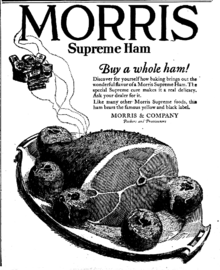Morris & Company
- This article is about the Chicago meatpacking company. For the decorative arts firm founded by William Morris, see Morris & Co..
Morris and Company, whose president was Edward Morris, was one of several meatpacking companies in Chicago, Illinois, and in South Omaha, Nebraska.

In 1902, it agreed to merge with the other two (Armour & Company and Swift & Company) to form a giant corporation called the National Packing Company. Conceived primarily as a holding company, National Packing soon began buying up smaller meat companies, such as G. H. Hammond and Fowler.
Between 1904 and 1910, National Packing acquired 23 stockyards and slaughtering plants nationwide, which gave it control over about one-tenth of U.S. meat production. The company owned branches in over 150 cities around the world, along with a fleet of 2,600 refrigerated railcars.
Starting in 1905, the constituent companies in National Packing were targeted by Arba Seymour Van Valkenburgh under the Elkins Act. Pressure from U.S. government regulators forced the dissolution of National Packing in 1912, leaving the structure of the American meat industry about the same as it had been before 1902.